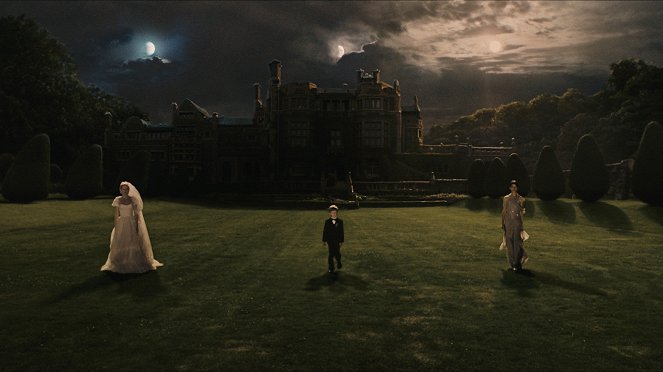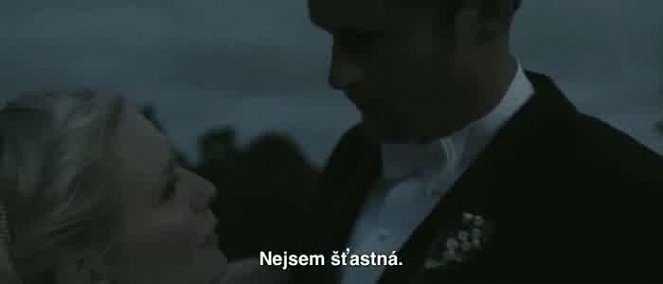Directed by:
Lars von TrierScreenplay:
Lars von TrierCinematography:
Manuel Alberto ClaroCast:
Kirsten Dunst, Charlotte Gainsbourg, Kiefer Sutherland, Charlotte Rampling, Udo Kier, Alexander Skarsgård, Stellan Skarsgård, John Hurt, Jesper Christensen (more)Plots(1)
From acclaimed director Lars von Trier comes the most stunning and compelling film of the year. Winner of the European Film Award for Best Film and the Cannes Film Festival Award for Best Actress (Kirsten Dunst), Melancholia is a beautiful film about the end of the world. Justine (Kirsten Dunst) and Michael (Alexander Skarsgård) are celebrating their marriage at a sumptuous party in the home of her sister Claire (Charlotte Gainsbourg), and brother-in-law John (Kiefer Sutherland). Despite Claire’s best efforts, the wedding is a fiasco, with family tensions mounting and relationships fraying. And as Claire tries to maintain the party's celebratory spirit, Justine struggles against her own dark demons. Meanwhile, a planet called Melancholia is heading directly towards Earth. (Madman Entertainment)
(more)Videos (2)
Reviews (12)
Succession for intellectuals and philosophers with a clearly outlined ending that doesn't give the viewer a chance. The development of the characters over the course of the film, however, does. The dialogue exposition is usually hellishly long and at times annoyingly abstract, but perhaps no one expected anything less from Lars von Trier.
()
It's not nearly as layered and symbolically connected and confusing as Antichrist. Actually, it's pretty unbalanced. The first part (Justine) is a classic raw probe into the "ceremony", in which, under the pleasing façade of luxury, hides the mud of pathological relationships and the utter emptiness of modern times (the scene in which the heroine frenetically changes the opened reproductions of modernist paintings behind the canvases of Breughel and Caravaggio, the episode with the advertising agency and the ideal slogan). The inspiration for Vinterberg and Lars' roots in Dogma 95 is more than obvious here. The whole thing is drawn to the unforeseen treacherous and dark Kirsten Dunst, who seems to be an earthly reflection of the approaching planet Melancholia - attractive, destructive, unpredictable. The second part, named after Justine's "settled" sister Claire, is a strangely monotonous wait for disaster, with Trier shifting perspective somewhat from the inside of the characters to the sky from which doom approaches. Some of the dialogues, even with hindsight, feel stretched and a little empty, but the overall vibration is powerful, with the ending being the most powerful. The strange static and passivity of the characters is actually exciting when compared to the obsessive "worldly fixers" of American movies. Justine's condemnation hovers over Melancholia like a memento: Life on Earth is evil. There's no point in looking for philosophy and message in that. Trier focused on the characters and the massively gradating wave of feeling that flounders between heaven and earth, laughter and sadness, love and hatred. Melancholia really left me with a deep melancholy. There's no point in asking why. Melancholy doesn't have a clear origin. It's like the planet. It just emerges behind the sun one day and then crashes mercilessly. It doesn't really matter how many rational complaints you can make about von Trier's new film. It is above all a pure and beautiful fetish. If you're from the same blue-green planet as Lars, of course.
()
My first meeting with Lars von Trier went very well. After the breathtaking introduction I was sorry I didn't catch Melancholia in the movie theatre. After the first part I was delighted and after the following part I was slightly confused but still extremely satisfied. The combination of handheld "earth" camera, "space" views (of which there are not many), music (Wagner!) and perfect acting performances (with the unbeatable Kiefer Sutherland in the lead) was a success. I probably didn't understand everything, but that's why I'll gladly watch the film again in the future.
()
It’s impossible to prepare oneself for Melancholia and the end of the world. Von Trier manages to capture that mood when there’s nothing you can do with a similar sense of urgency as Bergman. But he angers more people and additionally has Earth destroyed. Melancholia is a logical follow-up to Antichrist, which involved a clash between a man and a woman. This time, the clash is between two sisters, two approaches to life and ultimately two planets. The depressive Justine passively accepts her fate. She knows that she can’t change anything. At the same time, she represents extreme individualism. She would rather stay at home alone than submit to social conventions. Claire cares more about others. She doesn’t resign herself to the situation, but she wants to have it under control. Only at the end they switch roles and one finds understanding for the other. In its own way, it is a happy ending that, at the same time, shows how we spend our whole lives running away from the thought of death into magical caves, which can take different forms for everyone, but in the end they are of little help. Melancholia is also a biting polemic on American disaster movies, which conversely try to convince us that tragedy can be averted with human action and ingenuity (and Bruce Willis). Instead of a saviour, von Trier only offers two possible ways to accept the inevitable. On top of that, he forces us to spend the last hour before the end of the world with decadent representatives of high society who are definitely not bearers of noble qualities and have enough problems of their own. He thus doesn’t offer many reasons to wish for the end not to come, which I find more honest than the Hollywood approach. 85%
()
A pure pleasure. The opening is flawless, the finale fatal. It is excellent for lovers of Richard Wagner and Kirsten Dunst's bust and dimples. The pleasure is multiplied, of course, in the Justine section, which has everything and lacks nothing. Humor is combined with absurdity and symbolism. Why waste the primitive aspects of Udo Kier when we have Alexander Skarsgård's wonderful newlywed games? He hasn't been this close to orgasm since True Blood, and that's saying something.
()
Gallery (47)
Photo © Nordisk Film Swe.



Ads